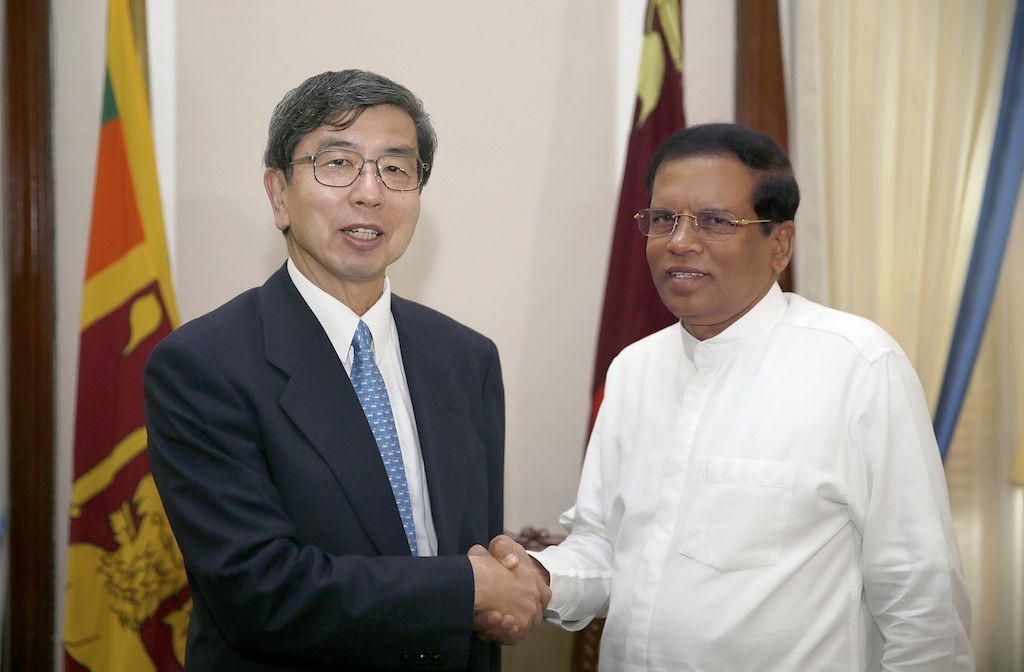
24 Feb, 2016
“Transformative Infrastructure” to dominate US$2 billion in ADB funding for Sri Lanka
Colombo, Sri Lanka, 23 February 2016 (ADB News) — Asian Development Bank (ADB) President Takehiko Nakao today met with Sri Lanka’s President Maithripala Sirisena, Prime Minister Ranil Wickremesinghe, and Finance Minister Ravi Karunanayake, and reaffirmed ADB’s strong commitment to support Sri Lanka’s continued development.
Mr. Nakao shared with the government ADB’s plans to scale up its operations in Sri Lanka. Together with the government, ADB is building a strong pipeline of projects and aims to provide over $2 billion in loans and equity in 2016 through 2018 compared with $1.5 billion in the preceding three years.
 ADB President Takehiko Nakao (left) and Sri Lanka President Maithripala Sirisena (right). |
“I look forward to working with the government in elaborating and implementing its development vision and strategy through increased ADB support,” Mr. Nakao said. “ADB is re-orienting its operations to meet the evolving needs of Sri Lanka as it moves to become an upper-middle-income country in the next few years,” Mr. Nakao said.
Until recently, ADB has focused on improving basic infrastructure, such as national and provincial roads, electricity transmission lines, and urban and rural water supplies. In the coming 3 years, ADB assistance will be further expanded to support higher-quality transformative infrastructure, including expressways, railway upgrades, wind power generation and building economic corridors to accelerate industrialization.
Mr. Nakao said in addition to infrastructure, human resource development would remain a key focus of ADB operations in Sri Lanka.
“Support to the education sector will expand with the growth of ADB operations and cover new areas to help Sri Lanka build a knowledge economy,” said Mr. Nakao. In this regard, ADB assistance will include support for college level education as well as science and engineering skills development.
In his meetings, Mr. Nakao praised the new government’s emphasis on good governance, inclusive growth, and private sector development. With a wealth of cultural heritage and rich natural and human resources, Sri Lanka is a country with a lot of potential, said Mr. Nakao.
Mr. Nakao reiterated the importance of prudent macroeconomic management, especially fiscal consolidation measures, for the country’s economy to grow at 6% or above per annum during 2016-2017. Both tax revenue enhancement and effective management of public expenditure are urgent tasks for the government. In this context, Mr. Nakao expressed his support for the government’s public finance management reform initiative, which will boost the credibility of the budget framework and improve controls and transparency in budget execution.
Prudent macroeconomic management should go hand in hand with structural reforms, Mr. Nakao stressed. Structural reforms are critical to ensure steady employment creation and the country’s entry into the global value chain. He also underlined the importance of attracting greater foreign direct investment to support robust economic growth.
During his 2-day stay in Sri Lanka, Mr. Nakao is visiting two ADB-financed projects. The Galle Grid Substation, funded under the Sustainable Power Sector Support Project, will improve electricity services in the southern province. He will also travel along the Southern Expressway, which has cut the travel time from Colombo to Matara from 4-5 hours to 1.5 hours.
The President also signed an innovative $100 million loan agreement to channel funds to small- and medium-sized enterprises through local banks. He witnessed the signing of a transaction advisory services agreement to develop Colombo Port’s East Container Terminal through a public-private partnership.
Sri Lanka was a founding member country of ADB. Since 1968, when its lending operations started in Sri Lanka, ADB has approved sovereign and non-sovereign loans totaling $7.49 billion (as of end-2015). ADB has also provided $358 million in grant assistance (including ADB-administered, cofinanced grants) for projects, and $130 million in 280 technical assistance grants.
ADB, based in Manila, is dedicated to reducing poverty in Asia and the Pacific through inclusive economic growth, environmentally sustainable growth, and regional integration. Established in 1966, it is owned by 67 members – 48 from the region.



Liked this article? Share it!